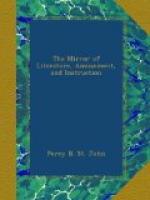At times, this immense mass of passions which he was accumulating against him, this multitude of avenging arms ready to be raised, filled his ambitious spirit with involuntary apprehension. Looking around him, he was alarmed to find himself solitary, and conceived the idea of strengthening his power by moderating it. Then it was that he thought of creating an hereditary peerage, and reconstructing his monarchy on more secure foundations. But Napoleon saw without illusion to the bottom of things. The nation, wholly and continually occupied in prosecuting the designs of its chief, had previously not had time to form any plans for itself. The day on which it should have ceased to be stunned by the din of arms, it would have called itself to account for its servile obedience. It is better, thought he, for an absolute prince to fight foreign armies, than to have to struggle against the energy of the citizens. Despotism had been organized for making war; war was continued to uphold despotism. The die was cast; France must either conquer Europe, or Europe subdue France.
Napoleon fell: he fell, because with the men of the nineteenth century he attempted the work of an Attila and a Genghis Khan; because he gave the reins to an imagination directly contrary to the spirit of his age, with which nevertheless his reason was perfectly acquainted; because he would not pause on the day when he felt conscious of his inability to succeed. Nature has fixed a boundary, beyond which extravagant enterprises cannot be carried with prudence. This boundary the emperor reached in Spain, and he overleaped it in Russia. Had he then escaped destruction, his inflexible presumption would have caused him to find elsewhere a Baylen and a Moscow— History of the War in the Peninsula, from the French of General Foy.
* * * * *
ROBINSON CRUSOES.
At one of the islands belonging to Juan de Ampues, the pilot ran away. Cifuentes and his crew, all equally ignorant of navigation, made sail for San Domingo, were dismasted in a gale of wind, and driven in the night upon the “Serrana” shoals; the crew, a flask of powder and steel, were saved, but nothing else. They found sea-calves and birds upon the island, and were obliged to eat them raw, and drink their blood, for there was no water. After some weeks, they made a raft with fragments of the wreck, lashed together with calf-skin thongs: three men went off upon it, and were lost. Two, and a boy, staid upon the island—one of whom, Moreno, died four days afterwards raving mad, having gnawed the flesh off his arms: the survivors, Master John and the boy, dug holes in the sand with tortoise-shells, and lined them with calf-skins to catch the rain. Where the vessel was wrecked, they found a stone which served them for a flint; this invaluable prize enabled them to make a fire. Two men had been living upon another island two leagues




